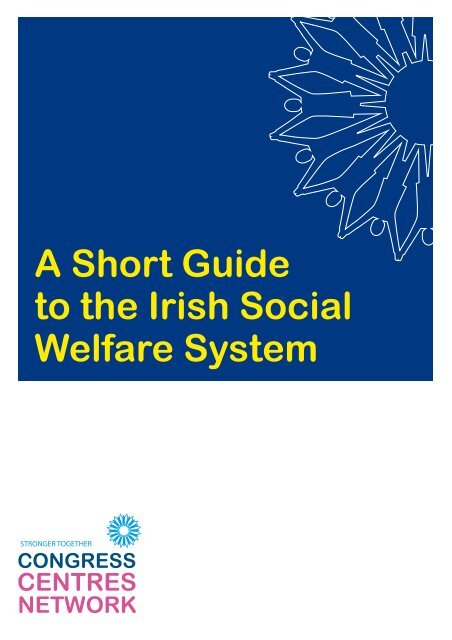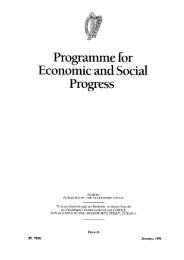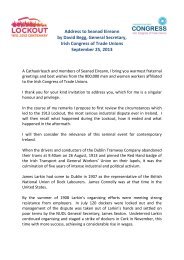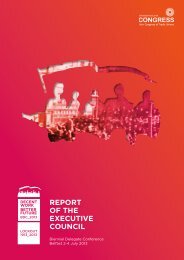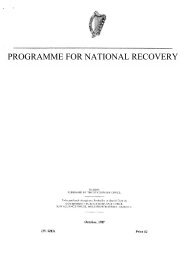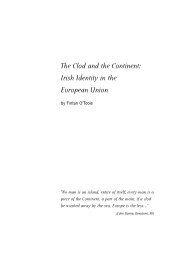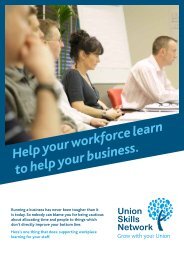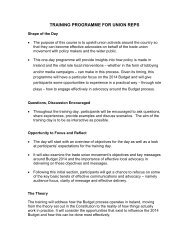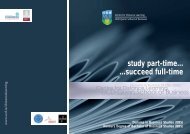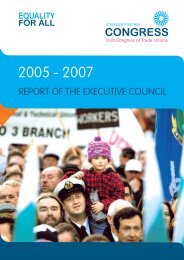A Short Guide to the Irish Social Welfare System - Irish Congress of ...
A Short Guide to the Irish Social Welfare System - Irish Congress of ...
A Short Guide to the Irish Social Welfare System - Irish Congress of ...
Create successful ePaper yourself
Turn your PDF publications into a flip-book with our unique Google optimized e-Paper software.
A <strong>Short</strong> <strong>Guide</strong><br />
<strong>to</strong> <strong>the</strong> <strong>Irish</strong> <strong>Social</strong><br />
<strong>Welfare</strong> <strong>System</strong>
<strong>Congress</strong><br />
<br />
Acknowledgements<br />
There are English, Polish, Russian, Lithuanian and Latvian<br />
versions <strong>of</strong> this booklet available.<br />
We gratefully acknowledge <strong>the</strong> financial assistance received<br />
from <strong>the</strong> Department <strong>of</strong> <strong>Social</strong> and Family Affairs for <strong>the</strong><br />
publication <strong>of</strong> <strong>the</strong>se booklets.<br />
We would also like <strong>to</strong> thank Ciara Murray who wrote <strong>the</strong><br />
English-language version and DCU Language Services who<br />
provided translations <strong>of</strong> <strong>the</strong> text from English in<strong>to</strong> Polish,<br />
Russian, Lithuanian and Latvian.
<strong>Social</strong> <strong>Welfare</strong> <strong>Guide</strong><br />
Contents<br />
<br />
Acknowledgements 2<br />
Contents 3<br />
Information 4<br />
How <strong>the</strong> <strong>System</strong> Works 6<br />
<strong>Social</strong> insurance payments 6<br />
Protecting your social insurance record 7<br />
<strong>Social</strong> assistance payments 8<br />
Universal benefits 9<br />
Extra income supports 10<br />
How much money is paid 12<br />
<strong>Social</strong> Assistance and Habitual Residence (HRC) 16<br />
<strong>Social</strong> Security & moving in <strong>the</strong> European Union 18<br />
Applying for a payment<br />
1<br />
Decisions and Appeals<br />
2<br />
Unemployment<br />
5<br />
Illness and disability<br />
6<br />
Caring<br />
9<br />
Bereavement<br />
1<br />
Parenting alone<br />
3<br />
Pregnancy<br />
5<br />
Child Supports<br />
6<br />
Retirement and older people<br />
8<br />
Supplementary <strong>Welfare</strong> Allowance (SWA) 40<br />
Working and claiming a social welfare payment 43
<strong>Congress</strong><br />
<br />
Information<br />
The Department <strong>of</strong> <strong>Social</strong> and Family Affairs (DSFA) is <strong>the</strong><br />
Government Department that controls and administers most<br />
income supports. Some income supports are administered by<br />
<strong>the</strong> Health Service Executive through local health centres.<br />
The social welfare system is complicated and you should get<br />
as much information as possible. This booklet aims <strong>to</strong> give you<br />
a snapshot <strong>of</strong> what is available.<br />
This booklet makes reference <strong>to</strong> <strong>the</strong> most up-<strong>to</strong>-date online<br />
information leaflets available from <strong>the</strong> DSFA website at www.<br />
welfare.ie .<br />
In person you can apply for payments and find information from:<br />
#<br />
#<br />
local social welfare <strong>of</strong>fices<br />
health centres<br />
You can also get independent support and advice from:<br />
#<br />
<strong>Congress</strong> Centres Network
<strong>Social</strong> <strong>Welfare</strong> <strong>Guide</strong><br />
#<br />
#<br />
Citizens Information Centres (CICs)<br />
Money Advice and Budgeting Service (MABS)<br />
<br />
To find <strong>the</strong> address for any <strong>of</strong> <strong>the</strong> above try one <strong>of</strong> <strong>the</strong> following:<br />
#<br />
#<br />
#<br />
Telephone direc<strong>to</strong>ry<br />
Contact your local <strong>Congress</strong> Centre – details on page 46<br />
Address finder: www.citizensinformation.ie – look for find<br />
an address option at <strong>the</strong> <strong>to</strong>p <strong>of</strong> <strong>the</strong> page.
<strong>Congress</strong><br />
<br />
How <strong>the</strong> <strong>System</strong> Works<br />
The <strong>Irish</strong> social welfare system has four main types <strong>of</strong> income<br />
support:<br />
#<br />
#<br />
#<br />
#<br />
<strong>Social</strong> insurance payments<br />
<strong>Social</strong> assistance payments<br />
Universal benefits<br />
Extra benefits/supplements<br />
<strong>Social</strong> insurance payments<br />
These payments are based on two principles<br />
1. You must have a specific number <strong>of</strong> Pay Related <strong>Social</strong><br />
Insurance (PRSI) contributions. Most employees will get a<br />
contribution for each week <strong>the</strong>y work and earn over €38.<br />
<strong>Social</strong> insurance contributions are sometimes called ‘stamps’.<br />
If you become unemployed or ill you may be entitled <strong>to</strong><br />
credited contributions for each week you are not working.
<strong>Social</strong> <strong>Welfare</strong> <strong>Guide</strong><br />
These contributions are called credits and can add up <strong>to</strong><br />
help you qualify for a payment. See below.<br />
<br />
Each payment has different social insurance contribution<br />
rules.<br />
2. You must also satisfy <strong>the</strong> rules that apply <strong>to</strong> your<br />
circumstances. For example if you became unemployed,<br />
you would have <strong>to</strong> show that you were ‘genuinely seeking<br />
work’ in order <strong>to</strong> receive a payment.<br />
Protecting your <strong>Social</strong> Insurance Record<br />
Credits: If you have <strong>to</strong> leave <strong>the</strong> workforce you will no longer<br />
be making paid social insurance contributions through your<br />
employment. In order <strong>to</strong> protect future entitlements <strong>to</strong> social<br />
welfare payments you need credited contributions for each<br />
week you are out <strong>of</strong> work. In many cases credits are awarded<br />
au<strong>to</strong>matically. In o<strong>the</strong>rs you will need <strong>to</strong> apply <strong>to</strong> receive credits.<br />
There are rules that you will need <strong>to</strong> satisfy if you want <strong>to</strong><br />
receive credited contributions. If you satisfy <strong>the</strong> rules you<br />
should always make sure you are getting credits. If you do not<br />
receive credits you may lose entitlement <strong>to</strong> a future payment.
<strong>Congress</strong><br />
<br />
Homemakers Scheme: This scheme applies if you leave<br />
<strong>the</strong> workforce and don’t satisfy <strong>the</strong> conditions for credits. The<br />
scheme does not pay any money but it helps protect your<br />
pension rights in <strong>the</strong> future.<br />
Online information<br />
Credits: www.welfare.ie/publications/sw12<br />
Homemakers Scheme: www.welfare.ie/publications/sw1<br />
<strong>Social</strong> assistance payments<br />
If you do not satisfy <strong>the</strong> conditions for an insurance payment<br />
you may get an assistance payment. The main rules for<br />
assistance payments are:<br />
1. You must pass a means test. A means test is a set <strong>of</strong><br />
rules that are used <strong>to</strong> assess <strong>the</strong> weekly value <strong>of</strong> any<br />
income savings, assets or cash you may have.<br />
This test will decide <strong>the</strong> level <strong>of</strong> your means. If your means<br />
are zero you will have passed <strong>the</strong> test and may qualify<br />
for full assistance. You may still qualify for assistance if<br />
your means are less than <strong>the</strong> payment suitable for your
<strong>Social</strong> <strong>Welfare</strong> <strong>Guide</strong><br />
circumstances. The amount you receive will be <strong>the</strong> full<br />
amount less your level <strong>of</strong> means.<br />
<br />
Most assistance payments have what are called ‘income<br />
disregards’. These are amounts <strong>of</strong> money that that are not<br />
taken in<strong>to</strong> account in <strong>the</strong> means test.<br />
2. You must satisfy <strong>the</strong> rules that apply <strong>to</strong> your circumstances.<br />
For example, if you became unemployed you would have<br />
<strong>to</strong> show that you were ‘genuinely seeking work’ in order <strong>to</strong><br />
receive a payment.<br />
3. For most social assistance payments you must also prove<br />
that you are Habitually Resident in <strong>the</strong> State. This is called<br />
<strong>the</strong> HRC Condition - see page 16 for more information.<br />
Universal Benefits<br />
No means tests or social insurance contribution rules apply.<br />
You must satisfy <strong>the</strong> rules that apply <strong>to</strong> your circumstances.<br />
The two most common universal benefits are:<br />
#<br />
#<br />
Child Benefit<br />
Free Travel
<strong>Congress</strong><br />
10<br />
Extra income supports<br />
These are supports that are provided in addition <strong>to</strong> your main<br />
social welfare payment.<br />
These supports are not available <strong>to</strong> everyone on a social<br />
welfare payment. They are <strong>of</strong>ten means tested, have rules<br />
regarding personal circumstances and may be dependent on a<br />
person receiving a particular payment.<br />
#<br />
#<br />
#<br />
#<br />
Treatment Benefit: Insurance rules apply. Assistance with<br />
some <strong>of</strong> <strong>the</strong> costs <strong>of</strong> optical/ dental care and hearing aids.<br />
www.welfare.ie/publications/sw24<br />
Free Travel/Companion Free Travel Pass.<br />
www.welfare.ie/publications/sw40<br />
Household Benefits: Assistance with electricity/gas,<br />
telephone and TV licence.<br />
www.welfare.ie/publications/sw107<br />
National Fuel Scheme: Assistance with <strong>the</strong> cost <strong>of</strong> fuel.<br />
www.welfare.ie/publications/sw17
<strong>Social</strong> <strong>Welfare</strong> <strong>Guide</strong><br />
#<br />
#<br />
Smokeless Fuel Scheme: Assistance with <strong>the</strong> cost <strong>of</strong> fuel in<br />
areas <strong>of</strong> high population.<br />
www.welfare.ie/publications/sw17a<br />
Living Alone Allowance.<br />
www.welfare.ie/publications/sw36<br />
11<br />
Supplementary <strong>Welfare</strong> Allowance (SWA)<br />
Help with <strong>the</strong> cost <strong>of</strong> Rent/Mortgage payments, once <strong>of</strong>f<br />
expenses, support while waiting for a payment - see page 40<br />
for more information.
<strong>Congress</strong><br />
12<br />
How much money is paid<br />
The maximum amount <strong>of</strong> money that will be paid for each<br />
social welfare payment is set out in <strong>the</strong> <strong>Social</strong> <strong>Welfare</strong> Rates<br />
<strong>of</strong> Payment Booklet (SW19). The amount you will receive is<br />
made up <strong>of</strong>:<br />
A personal rate for you and extra amounts for your partner and<br />
children if <strong>the</strong>y are considered qualified dependants<br />
Qualified adult: Your partner will be considered a qualified<br />
adult if <strong>the</strong>ir gross income is less than €100 per week. If<br />
<strong>the</strong>ir income is between €100 and €280 you may receive a<br />
reduced amount <strong>of</strong> money for <strong>the</strong>m.<br />
Qualified child: Dependent children under 18 are usually<br />
regarded as qualified children. Payments for child dependants<br />
are made for children over 18 in some circumstances. If you<br />
are claiming Jobseeker’s Benefit, Illness Benefit, Injury Benefit /<br />
Disablement Pension (Incapacity Supplement) and Health and<br />
Safety Benefit you will not receive a payment for your child if<br />
your spouse/partner has a weekly income <strong>of</strong> €400.00 or more.
<strong>Social</strong> <strong>Welfare</strong> <strong>Guide</strong><br />
13<br />
Or<br />
#<br />
A Family Rate This applies <strong>to</strong> people who are in receipt <strong>of</strong><br />
Disability Allowance, Farm Assist or Jobseekers allowance.<br />
The amount you receive depends on <strong>the</strong> size <strong>of</strong> your family.<br />
Remember if you are on a means tested payment <strong>the</strong> amount<br />
you receive may be reduced by <strong>the</strong> level <strong>of</strong> your means.
<strong>Congress</strong><br />
14<br />
Online information<br />
Rates <strong>of</strong> payment: www.welfare.ie/publications/sw19/sw19<br />
Dependents: Children: www.welfare.ie/foi/depsqc<br />
Adults:<br />
www.welfare.ie/foi/depsqa<br />
Receiving two social welfare payments<br />
There are circumstances when you might be entitled <strong>to</strong><br />
two payments at <strong>the</strong> same time. If this applies you must<br />
satisfy all <strong>the</strong> rules for both payments.<br />
If you have Widow/Widower’s Pension, Death Benefit or<br />
<strong>the</strong> One Parent Family Payment you can receive one <strong>of</strong> <strong>the</strong><br />
following payments at <strong>the</strong> same time.<br />
#<br />
#<br />
#<br />
#<br />
#<br />
illness benefit,<br />
injury benefit,<br />
maternity benefit,<br />
incapacity supplement or<br />
jobseeker's benefit.
<strong>Social</strong> <strong>Welfare</strong> <strong>Guide</strong><br />
The amount you receive will be limited <strong>to</strong> one full payment and<br />
half <strong>the</strong> personal rate <strong>of</strong> <strong>the</strong> o<strong>the</strong>r payment.<br />
15<br />
Carers<br />
If you (or your spouse) are a carer you may be entitled <strong>to</strong><br />
receive a half rate Carer’s Allowance in addition <strong>to</strong> your main<br />
social welfare payment. This does not apply in all cases. See<br />
page 29 for more information.<br />
Guardians<br />
If you are a guardian you may claim any social welfare payment<br />
in addition <strong>to</strong> <strong>the</strong> Guardian’s Payment. You will not receive an<br />
increase for a qualified child. A child for whom a Guardian’s<br />
Payment is paid may also be entitled <strong>to</strong> ano<strong>the</strong>r social welfare<br />
payment <strong>to</strong> be paid at <strong>the</strong> same time.<br />
Online information<br />
www.welfare.ie/foi/overlapping
<strong>Congress</strong><br />
16<br />
<strong>Social</strong> Assistance and Habitual<br />
Residence (HRC)<br />
A person must prove <strong>the</strong>y are habitually resident in <strong>the</strong><br />
State in order <strong>to</strong> qualify for most social assistance<br />
payments. This does not apply <strong>to</strong> insurance payments.<br />
It is not enough <strong>to</strong> live in <strong>the</strong> State <strong>to</strong> be considered habitually<br />
resident. Many aspects <strong>of</strong> a person’s life need <strong>to</strong> be examined<br />
<strong>to</strong> help decide if <strong>the</strong>ir residence is, or is likely <strong>to</strong> be, long-term.<br />
This is called <strong>the</strong> ‘main centre <strong>of</strong> interest’. The Department will<br />
look in particular at:<br />
#<br />
#<br />
#<br />
#<br />
#<br />
The length and nature <strong>of</strong> your residence in <strong>the</strong> State and<br />
any o<strong>the</strong>r country<br />
The length and purpose for any absence from <strong>the</strong> State<br />
The nature and pattern <strong>of</strong> your employment<br />
Your main centre <strong>of</strong> interest<br />
Your future intentions as <strong>the</strong>y appear from all <strong>the</strong><br />
circumstances.
<strong>Social</strong> <strong>Welfare</strong> <strong>Guide</strong><br />
Burden <strong>of</strong> Pro<strong>of</strong><br />
17<br />
If you have lived outside <strong>the</strong> State or <strong>the</strong> Common Travel Area<br />
for 2 years or more you are au<strong>to</strong>matically considered not <strong>to</strong> be<br />
habitually resident in <strong>the</strong> State. It is up <strong>to</strong> you <strong>to</strong> prove that you<br />
are.<br />
If you have lived within <strong>the</strong> State or <strong>the</strong> Common Travel Area<br />
for 2 years or more you must prove habitual residence but<br />
<strong>the</strong>re is not an assumption that you do not meet <strong>the</strong> condition.<br />
#<br />
A person who fails <strong>the</strong> Habitual Residence Condition under<br />
National Law may qualify for a payment under European<br />
law. See next page.<br />
Online Information:<br />
www.welfare.ie/foi/habres
<strong>Congress</strong><br />
18<br />
<strong>Social</strong> Security & moving in <strong>the</strong><br />
European Union<br />
<strong>Social</strong> insurance payments: EC Regulations are designed <strong>to</strong><br />
protect and coordinate your social security rights as you move<br />
within <strong>the</strong> European Union. These protections only apply if<br />
you move from one state <strong>to</strong> ano<strong>the</strong>r.<br />
You are allowed <strong>to</strong> combine your social insurance<br />
contributions from any <strong>of</strong> <strong>the</strong> EEA countries <strong>to</strong> help you qualify<br />
for social insurance payments.<br />
<strong>Social</strong> assistance payments: The minimum level <strong>of</strong> income<br />
support is available <strong>to</strong> migrant workers in <strong>the</strong> same way as<br />
<strong>Irish</strong> nationals. As a result, you may qualify for assistance<br />
under <strong>the</strong> Supplementary <strong>Welfare</strong> Allowance Scheme (see<br />
page 40) if you do not qualify for ano<strong>the</strong>r social welfare<br />
payment because <strong>of</strong> <strong>the</strong> Habitual Residence Condition (HRC)<br />
– see page 16 for more information.<br />
EU Law and family benefits: Family benefits include:<br />
Child Benefit, One Parent Family Payment, Guardian’s (Non-<br />
Contribu<strong>to</strong>ry) Payment and Family Income Supplement (FIS).<br />
Under National Law <strong>the</strong>se payments (o<strong>the</strong>r than FIS) require<br />
you <strong>to</strong> meet <strong>the</strong> HRC - see page 16 for more information.
<strong>Social</strong> <strong>Welfare</strong> <strong>Guide</strong><br />
#<br />
#<br />
#<br />
If <strong>the</strong> HRC prevents you from getting a payment you may<br />
qualify under EC Law. This means that you will not have <strong>to</strong><br />
satisfy <strong>the</strong> HRC condition if you are an EEA national who<br />
is employed or self-employed in Ireland and subject <strong>to</strong> <strong>the</strong><br />
<strong>Irish</strong> PRSI system.<br />
You may also claim Family Benefits if you are unemployed<br />
and in receipt <strong>of</strong> <strong>Irish</strong> Jobseeker’s Benefit.<br />
You can receive family benefits even if your children live in<br />
ano<strong>the</strong>r EEA State. The amount you receive depends on<br />
family benefit entitlements available in <strong>the</strong> country where<br />
your children reside.<br />
19<br />
Bilateral <strong>Social</strong> Security Agreements: If you have worked<br />
in a country outside <strong>of</strong> <strong>the</strong> European Economic Area (EEA) you<br />
should see if Ireland has a bilateral social security arrangement<br />
with that country.
<strong>Congress</strong><br />
20 Online Information<br />
Summary <strong>of</strong> EC Regulations and bilateral social security<br />
protection:<br />
#<br />
#<br />
#<br />
www.welfare.ie/publications/sw4/s3<br />
www.welfare.ie/foi/euregs<br />
www.welfare.ie/foi/bilateralguide<br />
See site below for information on <strong>Social</strong> Security in <strong>the</strong> EU<br />
www.ec.europa.eu/employment_social/social_security_<br />
schemes/eulisses/jetspeed/
<strong>Social</strong> <strong>Welfare</strong> <strong>Guide</strong><br />
Applying for a payment<br />
21<br />
To apply for a social welfare payment and communicate with<br />
<strong>the</strong> State you will need a Personal Public Service Number<br />
- PPS No. This number is a unique form <strong>of</strong> identification. If you<br />
do not already have a PPS No. you should go <strong>to</strong> your local<br />
social welfare <strong>of</strong>fice <strong>to</strong> apply for one.<br />
You will be asked <strong>to</strong> complete an application form and provide<br />
documentation <strong>to</strong> support your application. You may be<br />
interviewed by a <strong>Social</strong> <strong>Welfare</strong> Inspec<strong>to</strong>r. If you are applying<br />
for a disability or illness payment you may be asked <strong>to</strong> see a<br />
department Medical Assessor.<br />
While you are waiting for a decision you can apply for assistance<br />
from a Community <strong>Welfare</strong> Officer who will be based in your local<br />
health centre. See page 40 for more information.<br />
You must always notify <strong>the</strong> Department <strong>of</strong> <strong>Social</strong> and<br />
Family Affairs <strong>of</strong> any change in your circumstances.<br />
Contact Details for social welfare <strong>of</strong>fices and health centres<br />
nationally are available by using<br />
#<br />
Find an address search facility at<br />
www.citizensinformation.ie or a local telephone direc<strong>to</strong>ry
<strong>Congress</strong><br />
22<br />
Decisions and Appeals<br />
Decisions: You have a right <strong>to</strong> apply for a payment and<br />
receive a written decision. If you are refused a payment <strong>the</strong><br />
decision should state <strong>the</strong> reasons why.<br />
Most decisions relating <strong>to</strong> social assistance and social<br />
insurance payments are made by social welfare <strong>of</strong>ficials called<br />
‘Deciding Officers’. If you are unhappy with a decision by a<br />
Deciding Officer you have a right <strong>to</strong> appeal <strong>the</strong> decision <strong>to</strong> <strong>the</strong><br />
<strong>Social</strong> <strong>Welfare</strong> Appeals Office. A Deciding Officer will usually<br />
<strong>of</strong>fer you <strong>the</strong> opportunity <strong>to</strong> provide fur<strong>the</strong>r evidence <strong>to</strong> help<br />
your claim succeed before you make an appeal.<br />
Administrative decisions are usually not made by Deciding<br />
Officers. You can not appeal an administrative decision.<br />
You can however ask for an ‘internal review’ and/or make a<br />
complaint <strong>to</strong> <strong>the</strong> Ombudsman.<br />
Supplementary <strong>Welfare</strong> Allowance (SWA) – see page<br />
40. Decisions that relate <strong>to</strong> SWA payments are made by<br />
Community <strong>Welfare</strong> Officers or Superintendent Community<br />
<strong>Welfare</strong> Officers based in Health Centres.<br />
If you are not happy with a decision relating <strong>to</strong> a payment
<strong>Social</strong> <strong>Welfare</strong> <strong>Guide</strong><br />
under this scheme you must first make an appeal <strong>to</strong> <strong>the</strong> local<br />
Health Service Executive Appeals Office. If your appeal fails<br />
you can make a fur<strong>the</strong>r appeal <strong>to</strong> <strong>the</strong> <strong>Social</strong> <strong>Welfare</strong> Appeals<br />
Office (except in <strong>the</strong> case <strong>of</strong> Exceptional Needs and Urgent<br />
Needs Payments).<br />
23<br />
The Appeals Process: You must appeal a decision in writing<br />
outlining your case, and you should request all documents<br />
relating <strong>to</strong> your application/refusal. You have a right <strong>to</strong> this<br />
information under Freedom <strong>of</strong> Information legislation. You<br />
should also request an oral hearing. This allows you <strong>to</strong> present<br />
your case in person.<br />
If you are appealing a decision <strong>to</strong> refuse an illness/disability<br />
payment on medical grounds you will normally be sent for a<br />
second medical assessment by <strong>the</strong> Department. This is not<br />
<strong>the</strong> actual appeal.<br />
The Ombudsman’s Office: If your appeal fails you can make<br />
a complaint <strong>to</strong> <strong>the</strong> Ombudsman’s Office.
<strong>Congress</strong><br />
24 Online Information<br />
<strong>Social</strong> <strong>Welfare</strong> Appeals Office: www.socialwelfareappeals.ie<br />
Health Service Executive Appeals Office: contact head<br />
<strong>of</strong>fice in your area: www.hse.ie<br />
Assistance: <strong>Congress</strong> Centres Network -www.ictu.ie,<br />
Citizens Information Centres - www.citizensinformation or<br />
Money Advice Office - www.mabs.ie .<br />
Medical Assessment:<br />
www.welfare.ie/publications/mrinfo1<br />
Ombudsman: www.ombudsman.gov.ie
<strong>Social</strong> <strong>Welfare</strong> <strong>Guide</strong><br />
Unemployment<br />
25<br />
If you are unemployed or become unemployed you may be<br />
entitled <strong>to</strong> one <strong>of</strong> <strong>the</strong> following payments:<br />
Jobseeker’s Benefit: <strong>Social</strong> insurance rules apply.<br />
Jobseeker’s Allowance: Means testing rules and <strong>the</strong><br />
Habitual Residence Condition apply. See pages 8 and 16 for<br />
more information.<br />
For both payments require you must be:<br />
#<br />
#<br />
#<br />
#<br />
#<br />
available for work, capable <strong>of</strong> work and genuinely<br />
seeking work<br />
Working and receiving a payment page 43<br />
Receiving two social payments – page 14<br />
Protecting your insurance record – page 7<br />
Extra supports – page 10<br />
Online Information<br />
www.citizensinformation.ie/categories/social-welfare/socialwelfare-payments/unemployed-people
<strong>Congress</strong><br />
26<br />
Illness and disability<br />
If you are ill and/or have a disability you may be entitled <strong>to</strong> one<br />
<strong>of</strong> <strong>the</strong> following payments<br />
Illness Benefit: <strong>Social</strong> insurance rules apply.<br />
You must be unfit for work.<br />
Invalidity Pension: <strong>Social</strong> insurance rules apply. You should be<br />
permanently incapable <strong>of</strong> work due <strong>to</strong> your illness or disability.<br />
Disability Allowance: Means testing rules and <strong>the</strong> Habitual<br />
Residence Condition apply – see pages 8 and 16 for<br />
more information. You must have a disability or illness that<br />
substantially restricts your ability <strong>to</strong> work.<br />
#<br />
To help decide how your illness or disability affects you<br />
ability <strong>to</strong> work you may be called for a Medical Assessment<br />
by one <strong>of</strong> <strong>the</strong> Department’s medical assessors.<br />
There are also payments for <strong>the</strong> following situations:<br />
Blind Pension: A means tested payment for visually impaired<br />
people.
<strong>Social</strong> <strong>Welfare</strong> <strong>Guide</strong><br />
Occupational Injuries Scheme: Payments for insured<br />
workers who have an accident at work or have a disease due<br />
<strong>to</strong> <strong>the</strong> work <strong>the</strong>y do<br />
27<br />
Supplementary <strong>Welfare</strong> Allowance (SWA): Paid <strong>to</strong> people<br />
who are unfit for work, pass a means test and don’t qualify for<br />
any o<strong>the</strong>r payment.<br />
#<br />
#<br />
#<br />
#<br />
#<br />
Working and receiving a payment – page 43<br />
Receiving two social payments – page 14<br />
Protecting your insurance record – page 7<br />
Extra supports – page 10<br />
Caring – page 29
<strong>Congress</strong><br />
28 Online Information<br />
Illness Benefit: www.welfare.ie/publications/sw119<br />
Invalidity Pension: www.welfare.ie/publications/sw44<br />
Disability Allowance: www.welfare.ie/publications/sw29<br />
Blind Pension: www.welfare.ie/publications/sw76<br />
Occupational Injuries: www.welfare.ie/schemes/ill/oib<br />
SWA: www.welfare.ie/publications/sw54
<strong>Social</strong> <strong>Welfare</strong> <strong>Guide</strong><br />
Caring<br />
29<br />
If you become a carer for a person who needs full-time care<br />
and attention you may be entitled <strong>to</strong> one <strong>of</strong> <strong>the</strong> following:<br />
Carer’s Benefit: <strong>Social</strong> insurance and employment rules<br />
apply.<br />
Carer’s Allowance: Means testing rules apply – see page 8<br />
for more information.<br />
Half Rate Carer’s Allowance: Means testing rules apply. It<br />
is paid if you are a carer and entitled <strong>to</strong> ano<strong>the</strong>r social welfare<br />
payment at <strong>the</strong> same time. This payment is not available if<br />
you are receiving an unemployment payment, Supplementary<br />
<strong>Welfare</strong> Allowance or signing for unemployment credits.<br />
#<br />
The Habitual Residence Condition also applies <strong>to</strong> Carer’s<br />
Allowance full and half rate. See page 16 for more<br />
information.<br />
Respite Care Grant: This is a once yearly payment for carers.<br />
You do not have <strong>to</strong> pass a means test or satisfy any social<br />
insurance rules.
<strong>Congress</strong><br />
30 To qualify for <strong>the</strong> above payments you must satisfy <strong>the</strong><br />
rules that define a carer and a person being cared for.<br />
#<br />
#<br />
#<br />
Working and receiving a payment – page 43<br />
Protecting your insurance record – page 7<br />
Extra supports – page 10<br />
Online Information<br />
Carers Allowance: www.welfare.ie/publications/sw41<br />
Carers Benefit: www.welfare.ie/publications/sw49<br />
Respite Care Grant: www.welfare.ie/publications/sw113
<strong>Social</strong> <strong>Welfare</strong> <strong>Guide</strong><br />
Bereavement<br />
31<br />
If your spouse dies, you may be entitled <strong>to</strong> one <strong>the</strong> following<br />
payments:<br />
Widow/Widower’s Contribu<strong>to</strong>ry Pension: <strong>Social</strong> insurance<br />
rules apply.<br />
Widow/Widower’s Non-Contribu<strong>to</strong>ry Pension: Means<br />
testing and <strong>the</strong> Habitual Residence Condition apply – see<br />
pages 8 and 16 for more information. If you have children see<br />
Parenting alone – page 33.<br />
You must not be cohabiting<br />
#<br />
You can receive <strong>the</strong> above payments even if you are<br />
divorced from your late spouse<br />
Widowed Parent Grant: A once <strong>of</strong>f payment <strong>to</strong> help with <strong>the</strong><br />
income support <strong>of</strong> families after a spouse dies.<br />
Bereavement Grant: <strong>Social</strong> insurance rules apply. This is a<br />
once <strong>of</strong>f payment <strong>to</strong> help with funeral expenses.<br />
Death Benefits: These are benefits paid <strong>to</strong> survivors <strong>of</strong>
<strong>Congress</strong><br />
32<br />
a person who dies because <strong>of</strong> an accident at work or an<br />
occupational disease.<br />
#<br />
#<br />
#<br />
#<br />
Working and receiving a payment – page 43<br />
Receiving two social welfare payments – page 14<br />
Protecting your insurance record – page 7<br />
Extra supports – page 10<br />
Online information<br />
Widow/Widowers Contribu<strong>to</strong>ry & Non Contribu<strong>to</strong>ry Pension:<br />
www.welfare.ie/publications/sw25<br />
www.welfare.ie/publications/sw114<br />
Widowed parent grant: www.welfare.ie/publications/sw26<br />
Bereavement Grant: www.welfare.ie/publications/sw47<br />
Death Benefit: www.welfare.ie/publications/sw32
<strong>Social</strong> <strong>Welfare</strong> <strong>Guide</strong><br />
Parenting alone<br />
33<br />
If you are parenting alone you may be entitled <strong>to</strong> one <strong>of</strong> <strong>the</strong><br />
following payments:<br />
One Parent Family Payment: Means testing rules and <strong>the</strong><br />
Habitual Residence Condition apply – see pages 8 and 16 for<br />
more information.<br />
#<br />
You will also be asked <strong>to</strong> make efforts <strong>to</strong> seek maintenance<br />
from <strong>the</strong> o<strong>the</strong>r parent. Both parents are legally liable for<br />
<strong>the</strong> maintenance <strong>of</strong> <strong>the</strong>ir children and spouse (if married or<br />
divorced).<br />
If you are a widowed (including a divorced widow/widower)<br />
and parenting alone you may be entitled <strong>to</strong>:<br />
Widow/Widower’s Contribu<strong>to</strong>ry pension: <strong>Social</strong> insurance<br />
rules apply. See Bereavement on previous page.<br />
#<br />
#<br />
To receive <strong>the</strong> above payments you must not be cohabiting<br />
Some money from maintenance and earnings can be<br />
ignored in <strong>the</strong> means test.
<strong>Congress</strong><br />
34 # Working and receiving a payment – page 43<br />
#<br />
#<br />
#<br />
Receiving two social welfare payments – page 14<br />
Protecting your insurance record – page 7<br />
Extra supports –page 10<br />
Online Information<br />
One Parent Family Payment: www.welfare.ie/publications/sw82<br />
Maintenance: www.welfare.ie/foi/liabrelmaintrec
<strong>Social</strong> <strong>Welfare</strong> <strong>Guide</strong><br />
Pregnancy<br />
35<br />
If you are going <strong>to</strong> have a baby you may be entitled <strong>to</strong>:<br />
Maternity Benefit: Employment and social insurance rules apply.<br />
#<br />
If you do not qualify for Maternity Benefit you may be able<br />
<strong>to</strong> claim an unemployment payment while you are on<br />
Maternity Leave<br />
Health and Safety Benefit: <strong>Social</strong> insurance and<br />
employment rules apply. This can be paid if you are pregnant<br />
and have <strong>to</strong> leave work due <strong>to</strong> health and safety.<br />
#<br />
#<br />
#<br />
Receiving two social welfare payments – page 14<br />
Protecting your insurance record – page 7<br />
Extra supports – page 10<br />
Online Information<br />
www.welfare.ie/publications/sw11<br />
www.welfare.ie/publications/sw21
<strong>Congress</strong><br />
36<br />
Child Supports<br />
Child Dependent Allowance: Extra amounts paid with your<br />
main social welfare payment for each ‘qualified child’. See<br />
page 12 for more information.<br />
Child Benefit: This is paid <strong>to</strong> everybody with a ‘qualified<br />
child’. You must also satisfy <strong>the</strong> Habitual Residence Condition<br />
- see page 16 for more information.<br />
Early Childcare Supplement: This is paid for every child<br />
under 6 if <strong>the</strong>y are a qualified child.<br />
Guardian’s Payment (contribu<strong>to</strong>ry): <strong>Social</strong> insurance rules<br />
apply. This is paid if you are <strong>the</strong> guardian <strong>of</strong> a child who has<br />
been orphaned or abandoned.<br />
Guardian’s Payment (non-contribu<strong>to</strong>ry): Same as above<br />
but <strong>the</strong> child must pass a means test. See page 8 for more<br />
information.<br />
Adoptive Benefit: <strong>Social</strong> insurance rules apply. This is paid<br />
if you are adopting a child and taking adoptive leave from your<br />
employment.
<strong>Social</strong> <strong>Welfare</strong> <strong>Guide</strong><br />
#<br />
#<br />
#<br />
Receiving two social welfare payments – page 14<br />
Protecting your insurance record – page 7<br />
Extra supports – page 10<br />
37<br />
Online Information<br />
Child Benefit: www.welfare.ie/publications/sw42<br />
Guardian’s Payments: www.welfare.ie/publications/sw115<br />
Adoptive Benefit: www.welfare.ie/publications/sw37
<strong>Congress</strong><br />
38<br />
Retirement and older people<br />
If you are retired from <strong>the</strong> workforce you may be entitled <strong>to</strong>:<br />
State Pension (transition): <strong>Social</strong> insurance rules apply and<br />
you must be 65. You must be retired. A minimal amount <strong>of</strong><br />
work is allowed - €38 per week. Paid until you reach 66<br />
If you are 66 or over you may be entitled <strong>to</strong>:<br />
State Pension (contribu<strong>to</strong>ry): <strong>Social</strong> insurance rules apply.<br />
State Pension (non-contribu<strong>to</strong>ry): Means testing rules and<br />
<strong>the</strong> Habitual Residence Condition apply. See pages 8 and 16<br />
for more information.<br />
#<br />
#<br />
#<br />
Working and receiving a payment – page 43<br />
Protecting your insurance record – page 7<br />
Extra supports – page 10
<strong>Social</strong> <strong>Welfare</strong> <strong>Guide</strong><br />
Online Information<br />
39<br />
State Pension (contribu<strong>to</strong>ry and transition)<br />
www.welfare.ie/publications/sw118<br />
State Pension (non- contribu<strong>to</strong>ry)<br />
www.welfare.ie/publications/sw116
<strong>Congress</strong><br />
40<br />
Supplementary <strong>Welfare</strong><br />
Allowance (SWA)<br />
This is a social welfare scheme that is administered by <strong>the</strong><br />
Health Service Executive in local Health Centres <strong>of</strong> behalf <strong>of</strong><br />
<strong>the</strong> Department <strong>of</strong> <strong>Social</strong> and Family Affairs.<br />
#<br />
#<br />
#<br />
#<br />
SWA payments are means tested. See page 8 for more<br />
information.<br />
Usually you cannot receive an SWA payment if you are:<br />
working over 30 hours a week, in full-time education, or<br />
involved in a trade dispute. There are exceptions <strong>to</strong> this rule.<br />
The Habitual Residence Condition applies (see page 16)<br />
except for Exceptional and Urgent Needs payments.<br />
Each payment has specific rules that describe <strong>the</strong><br />
circumstances you must be in.
<strong>Social</strong> <strong>Welfare</strong> <strong>Guide</strong><br />
The scheme may entitle you <strong>to</strong> <strong>the</strong> following:<br />
41<br />
Basic SWA: Means testing rules and <strong>the</strong> Habitual Residence<br />
Condition apply. See pages 8 and 16 for more information.<br />
Paid if you have no money and ei<strong>the</strong>r are waiting for ano<strong>the</strong>r<br />
social welfare payment or do not qualify for a payment.<br />
Rent/Mortgage Supplements: Means testing and Habitual<br />
Residence Conditions apply. See pages 8 and 16 for more<br />
information. There are also rules in relation <strong>to</strong> your housing need.<br />
Exceptional Needs Payments: These are once <strong>of</strong>f payments<br />
for situations <strong>of</strong> exceptional need. An example would be<br />
assistance with <strong>the</strong> cost <strong>of</strong> a deposit on a flat if you had no<br />
o<strong>the</strong>r income.<br />
Urgent Needs Payments: These are payments for people in<br />
a crisis situation such as fire or flood who would not normally<br />
qualify for a social welfare payment. These payments can be<br />
made in <strong>the</strong> form <strong>of</strong> a repayable loan.<br />
Diet Supplement: This is a weekly supplement for people<br />
who need a special diet because <strong>of</strong> <strong>the</strong>ir medical condition.<br />
Back <strong>to</strong> School Clothing and Footwear Allowance: This is<br />
a once yearly payment made <strong>to</strong> families on low incomes with<br />
children.
<strong>Congress</strong><br />
42<br />
Online Information<br />
Supplementary <strong>Welfare</strong> Allowance:<br />
www.welfare.ie/publications/sw54<br />
Back <strong>to</strong> School Clothing and Footwear:<br />
www.welfare.ie/publications/sw75<br />
Supplementary <strong>Welfare</strong> Allowance <strong>Guide</strong>lines:<br />
www.welfare.ie/foi/swa
<strong>Social</strong> <strong>Welfare</strong> <strong>Guide</strong><br />
Working and claiming a<br />
social welfare payment<br />
43<br />
The system is complicated and each payment has its own<br />
set <strong>of</strong> rules if you want <strong>to</strong> take up some work or training while<br />
claiming a payment.<br />
Summary <strong>of</strong> main points<br />
Disability Payments: If you are on a disability or illness<br />
payment you will first need <strong>to</strong> get permission from <strong>the</strong><br />
Department <strong>of</strong> <strong>Social</strong> and Family Affairs <strong>to</strong> allow you <strong>to</strong> work or<br />
take up a training course. It must help rehabilitate you.<br />
Carer’s Payments: You must not work over 15 hours<br />
per week.<br />
Unemployment payments: You must not work more than<br />
3 days a week (Sunday does not count).<br />
Assistance based payments: If you are allowed <strong>to</strong> work<br />
<strong>the</strong> Department may apply ‘income disregards’. These are<br />
amounts <strong>of</strong> earnings/or income that are ignored in <strong>the</strong> relevant<br />
means tests that apply <strong>to</strong> your payment.
<strong>Congress</strong><br />
44 Insurance Payments: If your circumstances allow you <strong>to</strong><br />
work while on an insurance payment, usually <strong>the</strong> money you<br />
earn will not affect your payment. This is not <strong>the</strong> case with<br />
Jobseeker’s Benefit (JB). For each day you work while claiming<br />
JB you will lose <strong>the</strong> ‘daily rate’ <strong>of</strong> payment.<br />
#<br />
Many social insurance payments are considered taxable<br />
income. It is important that <strong>the</strong> Revenue Commissioners<br />
are aware <strong>of</strong> your circumstances.<br />
Employment Supports<br />
Family Income Supplement (FIS): Employment conditions<br />
and means testing apply. This is an income support paid <strong>to</strong><br />
people who have children and are in employment.<br />
Back <strong>to</strong> Work Allowance: This programme allows people<br />
who have been on social welfare payments for a long period<br />
<strong>of</strong> time <strong>to</strong> return <strong>to</strong> employment or self-employment and keep<br />
some <strong>of</strong> <strong>the</strong>ir social welfare payments.<br />
Back <strong>to</strong> Education Programme: This programme allows<br />
people who have been on social welfare payments for a long<br />
period <strong>of</strong> time <strong>to</strong> return <strong>to</strong> education or training and keep <strong>the</strong>ir<br />
social welfare payments.
<strong>Social</strong> <strong>Welfare</strong> <strong>Guide</strong><br />
Job Facilita<strong>to</strong>rs: These are social welfare staff based in<br />
local social welfare <strong>of</strong>fices. They help <strong>to</strong> advise you <strong>of</strong> back <strong>to</strong><br />
education/work options.<br />
45<br />
You must always notify <strong>the</strong> Department <strong>of</strong> <strong>Social</strong> and<br />
Family Affairs <strong>of</strong> any change in your circumstances.<br />
Online Information<br />
Means Testing: www.citizensinformation.ie/categories/<br />
social-welfare/irish-social-welfare-system<br />
Family Income Supplement: www.welfare.ie/publications/sw22<br />
Back <strong>to</strong> Work Allowance:<br />
www.welfare.ie/publications/sw93 (employees)<br />
www.welfare.ie/publications/sw92 (self-employed)<br />
Back <strong>to</strong> Education Programme:<br />
www.welfare.ie/publications/sw70
For fur<strong>the</strong>r information on services and opening times, please contact your<br />
nearest Centre:<br />
Name <strong>of</strong> Centre Phone Number E-mail address<br />
Dr. Steven’s Resource<br />
Centre, Athlone<br />
090-647 3001 coordina<strong>to</strong>r.athlone@congresscentres.net<br />
Athy Resource Centre 059-863 8523 coordina<strong>to</strong>r.athy@congresscentres.net<br />
Ballina People’s Resource<br />
Centre<br />
096-70885 coordina<strong>to</strong>r.mayo@congresscentres.net<br />
Belfast <strong>Congress</strong> Centre 048-9096 1111 coordina<strong>to</strong>r.belfast@congresscentres.net<br />
Caherciveen <strong>Congress</strong><br />
Information Centre<br />
Castlebar People’s<br />
Resource Centre<br />
<strong>Congress</strong> Information &<br />
Opportunity Centre, Ennis<br />
CCTU Employment<br />
Resource Centre<br />
066-947 2866 coordina<strong>to</strong>r.caherciveen@congresscentres.net<br />
094-902 2814 coordina<strong>to</strong>r.mayo@congresscentres.net<br />
065-684 1009 coordina<strong>to</strong>r.clare@congresscentres.net<br />
021-427 5876 coordina<strong>to</strong>r.cork@congresscentres.net<br />
Drogheda Resource Centre 041-983 5754 coordina<strong>to</strong>r.drogheda@congresscentres.net<br />
Dublin 12 <strong>Congress</strong> Centre 01-405 9377 coordina<strong>to</strong>r.dublin12@congresscentres.net<br />
Dundalk People’s Centre for<br />
Information & Training<br />
Dungarvan – The People’s<br />
Centre<br />
042-933 8820 coordina<strong>to</strong>r.dundalk@congresscentres.net<br />
058-44099 coordina<strong>to</strong>r.dungarvan@congresscentres.net<br />
The Fingal Centre 01-884 5228 coordina<strong>to</strong>r.fingal@congresscentres.net<br />
Galway Peoples’ Resource<br />
Centre<br />
091-564 822 coordina<strong>to</strong>r.galway@congresscentres.net
Noreside Resource Centre,<br />
Kilkenny<br />
Killarney Resource &<br />
Information Centre<br />
056-776 2146 coordina<strong>to</strong>r.kilkenny@congresscentres.net<br />
064-36863 coordina<strong>to</strong>r.killarney@congresscentres.net<br />
Leixlip Resource Centre 01-624 2511 coordina<strong>to</strong>r.leixlip@congresscentres.net<br />
<strong>Congress</strong> Resource Centre<br />
Letterkenny<br />
Limerick People’s Resource<br />
Centre<br />
Employment Development<br />
& Information Centre,<br />
Longford<br />
Mullingar <strong>Congress</strong><br />
Information & Development<br />
Centre<br />
Newbridge Resource<br />
Centre<br />
North Leitrim Resource<br />
Centre<br />
<strong>Congress</strong> Employment<br />
Information Centre, Tralee<br />
Wicklow Trade Union<br />
Centre<br />
074-912 8010 coordina<strong>to</strong>r.letterkenny@congresscentres.net<br />
061-416 056 coordina<strong>to</strong>r.limerick@congresscentres.net<br />
043-47515 coordina<strong>to</strong>r.longford@congresscentres.net<br />
044-934 5060 coordina<strong>to</strong>r.mullingar@congresscentres.net<br />
045-432 763 coordina<strong>to</strong>r.newbridge@congresscentres.net<br />
071-985 6029 coordina<strong>to</strong>r.northleitrim@congresscentres.net<br />
066-712 7617 coordina<strong>to</strong>r.tralee@congresscentres.net<br />
01-286 6730 coordina<strong>to</strong>r.bray@congresscentres.net<br />
<strong>Congress</strong> Centres Network 01-889 7777 kathleen.mccann@ictu.ie


